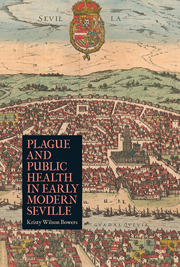Book contents
- Frontmatter
- Dedication
- Contents
- Acknowledgments
- Introduction
- 1 Early Modern Seville: Balancing Growth and Governance
- 2 Perceptions of Plague: Balancing Disease Concepts
- 3 Negotiating Public Health: Balancing the Individual and the Community
- 4 The Wider Politics of Public Health: Balancing Urban and Rural
- 5 City and Crown: Balancing Authorities
- Conclusion
- Notes
- Bibliography
- Index
4 - The Wider Politics of Public Health: Balancing Urban and Rural
Published online by Cambridge University Press: 05 October 2013
- Frontmatter
- Dedication
- Contents
- Acknowledgments
- Introduction
- 1 Early Modern Seville: Balancing Growth and Governance
- 2 Perceptions of Plague: Balancing Disease Concepts
- 3 Negotiating Public Health: Balancing the Individual and the Community
- 4 The Wider Politics of Public Health: Balancing Urban and Rural
- 5 City and Crown: Balancing Authorities
- Conclusion
- Notes
- Bibliography
- Index
Summary
Plague commissioners remained highly visible as they maintained contact with large numbers of residents, moving around the city to follow up on petitions, inspect goods, and check up on the sick. Amid this flurry of activity, a number of commissioners were also sent outside the city to carry out many of the same activities in the towns and villages of the tierra. They did so not just in the interest of protecting the city's residents, but also in the interest of all residents within the tierra. Monitoring the movement of people and goods around the countryside allowed commissioners to provide warnings and protective measures in areas before plague broke out. This meant that rather than creating isolation and limiting communication between cities and towns, in many cases plague actually increased official contact and communication.
Like all early modern cities, Seville engaged in a network of trade both locally, within its tierra, and regionally, across Andalucía. In addition, Seville's unique position as trade center for the New World made it all the more imperative for the city council to facilitate the continued operation of these trade networks. Yet the effects of plague legislation could range from disruptive to disastrous. Historians have long seen the negative effects of these bans as trade dwindled and travel became difficult. In his demographic study of early modern Cuenca, David Reher asserts that “the appearance or the mere rumor of disease had disastrous effects on the local economy. Efforts to isolate the town brought commercial activities to a halt, created a shortage of labor, stimulated inflation and otherwise tended to undermine most economic activity.”
- Type
- Chapter
- Information
- Plague and Public Health in Early Modern Seville , pp. 69 - 88Publisher: Boydell & BrewerPrint publication year: 2013

